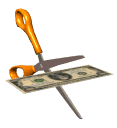|
Many people spend money without really thinking about
it.  As
you try to get a handle on your spending, the first thing
you have to recognize is that what you need
is different than what you want. There is a big difference between the two! To cut spending,
cut down on buying things you want
but don’t really need. As
you try to get a handle on your spending, the first thing
you have to recognize is that what you need
is different than what you want. There is a big difference between the two! To cut spending,
cut down on buying things you want
but don’t really need.
You need housing, food, clothing,
transportation, insurance, and other necessities of life.
Some of these, such as the air we breathe, don’t
cost anything at all. Others, like electricity, do. Once you have the necessary things in life,
any spending becomes more about what you want than what you
need.
For
 example, you need a watch to tell time and stay punctual,
but you want a Rolex timepiece.
You want a SAAB convertible, but you can get places
on a public bus.
example, you need a watch to tell time and stay punctual,
but you want a Rolex timepiece.
You want a SAAB convertible, but you can get places
on a public bus.
Here
are some ways to tell the difference between a want and a
need:
1.
If you need it, you will automatically seek and buy it without
anyone selling you. No one has to advertise water or heat.
2.
If it’s a want, you can put off buying it until later.
3.
If it’s a want, you can probably use a cheaper item.
4.
If you replace something you already have
that’s still
working,
that replacement’s probably a want, not a need.
|
5. Unlike needs, wants can be addictive and/or harmful. Cigarettes are just one example. No one needs them, but some people want them.
Our American standard
of living is so good that most of us own things that would
be considered luxuries, not needs, in poorer countries
like Africa or Latin America.
Because we live in a consumer society, we are exposed to thousands of
advertisements a year. The purpose of these ads is to get us to buy things we may not need.
 At one time or another, we’ve all given into buying something on impulse. You know, that’s when you enter the grocery store for a gallon of milk and come out with $20 less in your wallet. Impulse purchases are made at that moment, rather than planned ahead of time. An example of impulse purchase "bait" is the placement of those "little extras" near the checkout stands. Try to look the other way to avoid spending impulsively. At one time or another, we’ve all given into buying something on impulse. You know, that’s when you enter the grocery store for a gallon of milk and come out with $20 less in your wallet. Impulse purchases are made at that moment, rather than planned ahead of time. An example of impulse purchase "bait" is the placement of those "little extras" near the checkout stands. Try to look the other way to avoid spending impulsively.
Shopping can become a psychological addiction sometimes referred to as being a “shopaholic” or the American Psychological Associaton clinical term “oniomania” which affects between 2-6% of all Americans. “shopaholic” or the American Psychological Associaton clinical term “oniomania” which affects between 2-6% of all Americans.
Research at Stanford
University links oniomania with depression. The compulsive
shopper, usually a woman, goes to the mall to feel better,
and to cure loneliness, sadness and anger. Unlike drugs,
gambling or alcohol addictions, oniomania is socially
acceptable,
meaning that people are likely to openly discuss it and perhaps
even minimize the problems it causes.
|